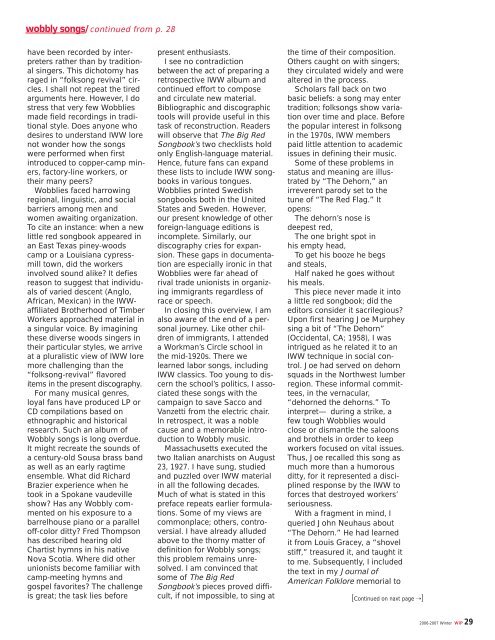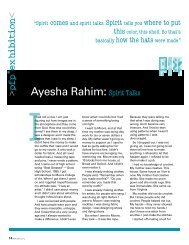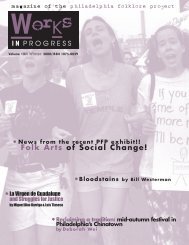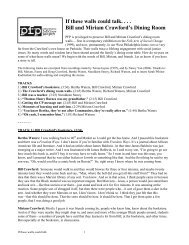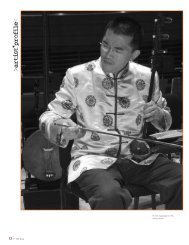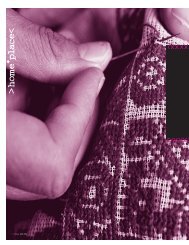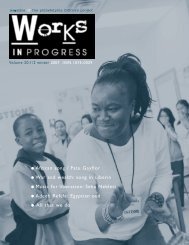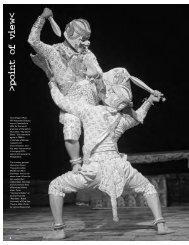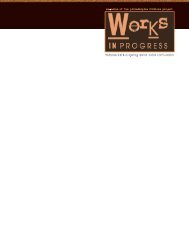The Big Red Songbook: - Philadelphia Folklore Project
The Big Red Songbook: - Philadelphia Folklore Project
The Big Red Songbook: - Philadelphia Folklore Project
You also want an ePaper? Increase the reach of your titles
YUMPU automatically turns print PDFs into web optimized ePapers that Google loves.
wobbly songs/continued from p. 28<br />
have been recorded by interpreters<br />
rather than by traditional<br />
singers. This dichotomy has<br />
raged in “folksong revival” circles.<br />
I shall not repeat the tired<br />
arguments here. However, I do<br />
stress that very few Wobblies<br />
made field recordings in traditional<br />
style. Does anyone who<br />
desires to understand IWW lore<br />
not wonder how the songs<br />
were performed when first<br />
introduced to copper-camp miners,<br />
factory-line workers, or<br />
their many peers?<br />
Wobblies faced harrowing<br />
regional, linguistic, and social<br />
barriers among men and<br />
women awaiting organization.<br />
To cite an instance: when a new<br />
little red songbook appeared in<br />
an East Texas piney-woods<br />
camp or a Louisiana cypressmill<br />
town, did the workers<br />
involved sound alike? It defies<br />
reason to suggest that individuals<br />
of varied descent (Anglo,<br />
African, Mexican) in the IWWaffiliated<br />
Brotherhood of Timber<br />
Workers approached material in<br />
a singular voice. By imagining<br />
these diverse woods singers in<br />
their particular styles, we arrive<br />
at a pluralistic view of IWW lore<br />
more challenging than the<br />
“folksong-revival” flavored<br />
items in the present discography.<br />
For many musical genres,<br />
loyal fans have produced LP or<br />
CD compilations based on<br />
ethnographic and historical<br />
research. Such an album of<br />
Wobbly songs is long overdue.<br />
It might recreate the sounds of<br />
a century-old Sousa brass band<br />
as well as an early ragtime<br />
ensemble. What did Richard<br />
Brazier experience when he<br />
took in a Spokane vaudeville<br />
show? Has any Wobbly commented<br />
on his exposure to a<br />
barrelhouse piano or a parallel<br />
off-color ditty? Fred Thompson<br />
has described hearing old<br />
Chartist hymns in his native<br />
Nova Scotia. Where did other<br />
unionists become familiar with<br />
camp-meeting hymns and<br />
gospel favorites? <strong>The</strong> challenge<br />
is great; the task lies before<br />
present enthusiasts.<br />
I see no contradiction<br />
between the act of preparing a<br />
retrospective IWW album and<br />
continued effort to compose<br />
and circulate new material.<br />
Bibliographic and discographic<br />
tools will provide useful in this<br />
task of reconstruction. Readers<br />
will observe that <strong>The</strong> <strong>Big</strong> <strong>Red</strong><br />
<strong>Songbook</strong>’s two checklists hold<br />
only English-language material.<br />
Hence, future fans can expand<br />
these lists to include IWW songbooks<br />
in various tongues.<br />
Wobblies printed Swedish<br />
songbooks both in the United<br />
States and Sweden. However,<br />
our present knowledge of other<br />
foreign-language editions is<br />
incomplete. Similarly, our<br />
discography cries for expansion.<br />
<strong>The</strong>se gaps in documentation<br />
are especially ironic in that<br />
Wobblies were far ahead of<br />
rival trade unionists in organizing<br />
immigrants regardless of<br />
race or speech.<br />
In closing this overview, I am<br />
also aware of the end of a personal<br />
journey. Like other children<br />
of immigrants, I attended<br />
a Workman’s Circle school in<br />
the mid-1920s. <strong>The</strong>re we<br />
learned labor songs, including<br />
IWW classics. Too young to discern<br />
the school’s politics, I associated<br />
these songs with the<br />
campaign to save Sacco and<br />
Vanzetti from the electric chair.<br />
In retrospect, it was a noble<br />
cause and a memorable introduction<br />
to Wobbly music.<br />
Massachusetts executed the<br />
two Italian anarchists on August<br />
23, 1927. I have sung, studied<br />
and puzzled over IWW material<br />
in all the following decades.<br />
Much of what is stated in this<br />
preface repeats earlier formulations.<br />
Some of my views are<br />
commonplace; others, controversial.<br />
I have already alluded<br />
above to the thorny matter of<br />
definition for Wobbly songs;<br />
this problem remains unresolved.<br />
I am convinced that<br />
some of <strong>The</strong> <strong>Big</strong> <strong>Red</strong><br />
<strong>Songbook</strong>’s pieces proved difficult,<br />
if not impossible, to sing at<br />
the time of their composition.<br />
Others caught on with singers;<br />
they circulated widely and were<br />
altered in the process.<br />
Scholars fall back on two<br />
basic beliefs: a song may enter<br />
tradition; folksongs show variation<br />
over time and place. Before<br />
the popular interest in folksong<br />
in the 1970s, IWW members<br />
paid little attention to academic<br />
issues in defining their music.<br />
Some of these problems in<br />
status and meaning are illustrated<br />
by “<strong>The</strong> Dehorn,” an<br />
irreverent parody set to the<br />
tune of “<strong>The</strong> <strong>Red</strong> Flag.” It<br />
opens:<br />
<strong>The</strong> dehorn’s nose is<br />
deepest red,<br />
<strong>The</strong> one bright spot in<br />
his empty head,<br />
To get his booze he begs<br />
and steals,<br />
Half naked he goes without<br />
his meals.<br />
This piece never made it into<br />
a little red songbook; did the<br />
editors consider it sacrilegious?<br />
Upon first hearing Joe Murphey<br />
sing a bit of “<strong>The</strong> Dehorn”<br />
(Occidental, CA; 1958), I was<br />
intrigued as he related it to an<br />
IWW technique in social control.<br />
Joe had served on dehorn<br />
squads in the Northwest lumber<br />
region. <strong>The</strong>se informal committees,<br />
in the vernacular,<br />
“dehorned the dehorns.” To<br />
interpret— during a strike, a<br />
few tough Wobblies would<br />
close or dismantle the saloons<br />
and brothels in order to keep<br />
workers focused on vital issues.<br />
Thus, Joe recalled this song as<br />
much more than a humorous<br />
ditty, for it represented a disciplined<br />
response by the IWW to<br />
forces that destroyed workers’<br />
seriousness.<br />
With a fragment in mind, I<br />
queried John Neuhaus about<br />
“<strong>The</strong> Dehorn.” He had learned<br />
it from Louis Gracey, a “shovel<br />
stiff,” treasured it, and taught it<br />
to me. Subsequently, I included<br />
the text in my Journal of<br />
American <strong>Folklore</strong> memorial to<br />
[Continued on naxt page ➝]<br />
2006-2007 Winter WIP 29


